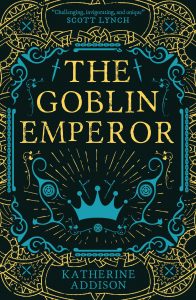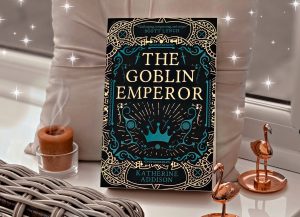THE GOBLIN EMPEROR by Katherine Addison (BOOK REVIEW)
“The lantern light mocked him, a taunting reminder of the light of the world. He shut his eyes so that he would not have to watch the light of the candle recede, and counted slowly to one hundred. When he opened his eyes, he looked around at the cool darkness, this well of silence, the weight of rock and loneliness, and thought, this is what it is to be emperor”
The Goblin Emperor by Katherine Addison follows our main protagonist Maia Drazhar, youngest son of the Emperor of the Elflands, who, because of a purely political marriage between the Emperor and a goblin princess, is born half-goblin. Scorned by the Emperor himself and the royal court, at just eight years of age, after the death of his beloved mother Chenelo, Maia is immediately sent away to live in seclusion in Edonomee, in the care of his cruel, malevolent cousin Setheris.
 However, after the Emperor and all his remaining sons are killed in an ‘accident’ onboard the airship Wisdom of Choharo, Maia is suddenly thrust into becoming the next Emperor of the Elflands. Completely unprepared and overwhelmed, throughout this book we witness Maia painfully try to adjust to court life where he faces betrayal, prejudice, complex politics and an impending arranged marriage, all at the tender age of just eighteen. Addison delivers us a truly unique tale here of a half goblin, completely out of his depth, but a character who is purely earnest, whose journey we follow willing him to succeed every step of the way.
However, after the Emperor and all his remaining sons are killed in an ‘accident’ onboard the airship Wisdom of Choharo, Maia is suddenly thrust into becoming the next Emperor of the Elflands. Completely unprepared and overwhelmed, throughout this book we witness Maia painfully try to adjust to court life where he faces betrayal, prejudice, complex politics and an impending arranged marriage, all at the tender age of just eighteen. Addison delivers us a truly unique tale here of a half goblin, completely out of his depth, but a character who is purely earnest, whose journey we follow willing him to succeed every step of the way.
The Goblin Emperor surprised me in many ways; as much as I love an action packed, often darker fantasy read, it was highly refreshing to come across a book where the entire plot is a gentle character study, where we take an in depth insight into court politics, where we come across a character with an enormous kind heart. In an interview with Katherine Addison on The Fantasy Hive for Women In SFF, Addison described her book as ”a refreshing digression from the diet of grimdark fantasy” which I have to say is a statement I completely agree with. The book is a purely character driven story set in a world that is entirely inhabited by elves and goblins, and explores themes of grief, anxiety, loneliness and even the after effects of abuse. For the entirety of the narrative we see that Maia doesn’t fit in with the elvish race as they feel unease by even the mere sight of his dark goblin skin, but equally he feels out of place amongst the goblins as he’s never had the opportunity to learn much about his goblin heritage from his mother, and therefore is unfamiliar with their culture. Maia continuously doubts himself, he berates himself just as his cousin Setheris had always done to him. He also shows such deep grief and longing for his mother, Chenelo, the only person to ever show him affection, yet he hides this with grace. That is what I find made Maia so relatable, he is a vulnerable character who is very much an outcast.
“It was restful and she was beautiful, and he thought she was flirting with him, although he had no idea how to respond. She made him feel almost normal, almost as if he belonged“
One of the aspects I found most captivating throughout this novel was the way Maia adjusted to a completely new way of life, how he had to deal with the nobles who were manipulating his innocence and watching him deal out punishments to those caught betraying him. Maia is nothing but courteous to all, be they a nobleman or a servant, he strives to treat all as equals; his kindness makes him likeable to the servants and messengers and the lesser nobility, whilst it only infuriates the higher nobility, as they feel it is not befitting of an emperor to behave as such. Therefore he cannot always decipher who is plotting against him, and when the time for punishment comes he always attempts to find the least violent way to treat his subjects. However this isn’t always possible, and some crimes such as treason can only be dealt with by execution, but seeing how uncomfortable and upset this leaves Maia, and how he always makes sure the family of the convicted are well cared for, shows us exactly how considerate and heartfelt he truly is, unlike his father. Once crowned Emperor, Maia doesn’t resort to being a tyrant, even during the times he feels out of place during royal engagements or when not understanding the political moves he should make. Maia is a very human character, despite him not even being human.
I found it rather amusing that once crowned Emperor, Maia is then only addressed as “Serenity”, which ironically is nothing of how he feels. Whilst I touch upon the subject of names, my only issue whilst reading was that Addison introduces us to many minor characters, especially within the nobility and royal advisors, and personally I found all the long extended titles rather overwhelming. Perhaps this was purposely done so that the reader mirrors the overwhelming feeling Maia also experiences? Thankfully Addison does include a glossary which I found a useful resource, but as we only see these characters briefly, by the time they return later on in the novel I had forgotten who they were, and therefore I found it jarring having to look them up again. However, I did enjoy the way Addison used these characters to explore gender and class politics. The Elflands is a patriarchal world, where many of the characters have very little choices in life, particularly for female elves when concerning education and marriage, yet subtly over time Maia begins to change this.
“Ulis was a cold god, a god of night and shadows and dust. His love was found in emptiness, his kindness in silence. And that was what Maia needed. Silence, coldness, kindness.”
Addison’s prose was so elegant to read, and I adored all the little details she included to bring her worldbuilding to life. For example, the characters all used the royal “we” whenever talking about themselves. This use of the plural became quite addictive and we strangely found ourselves also using it everytime we put the book down. We also loved the way Addison attributed the movement of elven ears as a sign for their emotions – the ears raised, flattened, and twitched instinctively, almost speaking their own language.
The Goblin Emperor oozes in sophistication, charm, and features one of the most heartfelt characters you will come across in a fantasy novel. Addison shows us that not every fantasy needs to be dark, gritty and violent to be compelling, sometimes following a gentle vulnerable character through extraordinary experiences can be just as entertaining.
Review copy provided by Hannah at Rebellion Publishing in exchange for an honest review. Thank you for the copy! The Goblin Emperor is out now.

